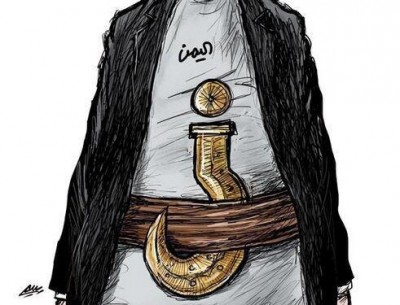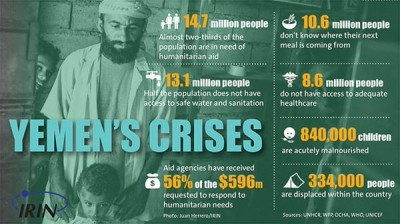
A telling cartoon about Yemen by Amjad Rasmi where the traditional Yemeni dagger (Janbiyah) worn by Yemenis is an inverted question mark instead.
Yemen, often described as a “failed state” or “on the brink“, has become a country without a president and a government. In addition to observers, Yemenis living inside the country are also perplexed by the latest dramatic developments unfolding in Yemen, which resulted in the swift takeover of its capital city, Sanaa, by the Houthi militia. The Houthi militia also took over the state media, the Presidential Palace and residence, and the Prime Minister's residence, blockading government buildings and taking over a military installation, ultimately resulting in the resignation of the Prime Minister, cabinet and president on Thursday, January 20th.
Yemeni journalist and head of Yemen Polling Center, Hafez Albukari tweeted:
Yemenis are witnessing one of the most mysterious times in the contemporary history. We r n Sanaa but don’t know what is happening! #Yemen
— Hafez Albukari (@hafezbukari) January 21, 2015
After capturing Amran mid-summer, the Houthis, a rebel group reportedly backed by Iran and who claim their movement is against corruption and embezzlement, took over Sana'a and the rest of the country last September and eventually became the de facto power in Yemen. With the signing of the Peace and National Partnership Agreement (PNPA), a power sharing deal which aimed to bring the Houthis and Southern separatists into a more inclusive government, the president was required to appoint a Prime Minister who was “neutral, without any party affiliations” within 3 days and to form a new cabinet within 30 days. However, finding a Prime Minister who would fit that criteria and be approved by all factions was a challenge.
Hisham Al-Omeisy sarcastically tweeted:
Disturbingly, this is no longer reason for delay in selecting #Yemen PM..new PM now just needs be agreeable to all! pic.twitter.com/4xkz4YPVAc
— Hisham Al-Omeisy (@omeisy) October 6, 2014
The President initially nominated Ahmed Awad Ben Mubarak, who was the Secretary General of the National Dialogue Conference (NDCYE). However, ousted president Ali Abdullah Saleh and his Party, the General People's Congress (GPC), along with the Houthis, objected. Ben Mubarak who was President Abdu Rabu Mansour Hadi's chief of staff was kidnapped by the Houthis last Saturday, January, 17th and remains so until the writing of this post. Khaled Mahfoudh Bahah, who was at that time Yemen's envoy to the United Nations and served as oil minister, was appointed instead as Prime Minster on October 13th, 2014 and was welcomed by the Houthis. After nominations and rejections, the newly appointed cabinet which included young names and four ministerial posts assigned to women, was a promising mixture which brought optimism and hope nevertheless.
Yet the PNPA, and the best cabinet formed since 2011, did not survive for long. The Houthis militancy and never ending demands drove away initial sympathisers as the vision of a civil and less corrupt Yemen faded away. Instead of honouring their part of the agreement by withdrawing, the Houthis spread more militias and road blocks across Sana'a and kidnapped the president's chief of staff demanding changes in the draft constitution and more power, which led to the complete takeover of Sanaa in last week's events.
Waddah Othman tweeted what the distorted meaning of partnership was according to the Houthis:
فرض الشراكة هو انك تنفذ لي كل الحاجات اللي اشتيها وبالنسبة للحاجات اللي تشتيها انت ممكن نجلس لاحقاً ونناقشها
— وضاح اليمن (@WaddahOthman) January 19, 2015
A partnership is you implementing for me all the needs I want but regarding your needs we you can sit and discuss them later
Despite the international and Gulf media hyped fear that AQAP (Al-Qaeda in the Arab Peninsula) or Iran might take over Yemen, Yemenis main concern is who will fill the power vacuum in their country.
Haykal Bafana, dismissed that threat with his tweet:
Manic Western press : Lay off all these Tehran Terror stories on Yemen. I don't hear no one speaking Farsi on the streets of Sanaa yet.
— Haykal Bafana (@BaFana3) January 23, 2015
Gregory Johnson, author of “The Last Refuge: Yemen, al-Qaeda, and America's War in Arabia” supported that by saying:
Either AQAP is about to take over Yemen, or Iran is about to take over Yemen. (Neither is true.)
— GregorydJohnsen (@gregorydjohnsen) January 23, 2015
He added:
Badr al-Din al-Huthi- the father of ‘Abd al-Malik – spent time in Iran, but that didn't make him either a 12'er Shia or Iranian client.
— GregorydJohnsen (@gregorydjohnsen) January 23, 2015
Many in Yemen question the Houthis’ intentions and their sudden rise to power – their being a minority group yet being able to swiftly gain control over cities across Yemen, raid state institutions, sack public officials, eventually bringing the government to its knees. What appears undisputed is that the Houthis are not acting alone.
Osamah Al-Rawhani wonders:
#Yemen Before sleep Q: what is the Houthi legitimacy to do all this bulls**t? He speaks on behalf of a minority group but still controlling
— Osama Abdullah (@AlrawhaniOsama) January 19, 2015
Abubakr Al-Shami hints at Saleh's involvement:
Sometimes you just have to stand back and applaud. Well done Ali Abdullah Saleh.
— Abubakr Al-Shamahi (@abubakrabdullah) January 22, 2015
Afrah Nasser, a Yemeni Journalist and blogger living in Sweden, points it out clearily:
W/ Houthis taking over forcefully,it's not tht Yemen is a failed state,it's that Saleh remains a highly influential man backing the Houthis.
— Afrah Nasser (@Afrahnasser) January 19, 2015
Many cannot answer the question of who will lead the country, and there is a fear of a possible scenario where the former regime returns through a younger facade, especially after ousted President Ali Abdullah Saleh called for early elections, perhaps paving the way for his elder son. He was seen as the mastermind pulling the strings in last week's dramatic events.
According to the Yemen Times (quoting Nadia Al-Sakkaf), Yemen's Minister of Information in Bahah's government, courageously tweeted updates during the Houthi take-over:
Under the current constitution — the draft constitution remains under debate — if the president is harmed and unable to continue, or if he steps down, the head of Parliament is to ascend to the position. The current head of Parliament, Yahya Al-Rayi, is a high-ranking member of the GPC and was injured in a 2011 attack on the Presidential Palace.
However, the mandate of the current Parliament, which was elected in 2003, was due to expire after six years, in 2009. Under an agreement, the elections were postponed two years. Elections were due in 2011, but were postponed again following the 2011 uprising. The GPC holds 238 out of 301 seats in Parliament.
With Hadi’s resignation the initiative would no longer be in effect, according to Al-Sakkaf, and Parliament’s extended mandate would be dissolved, removing the possibility of Al-Rayi ascending to the presidency.
Jeb Boone, an American journalist who was living in Yemen during the 2011 uprising which ousted Saleh, commented:
If international community had allowed #Yemen‘s youth to oust the old systems of government in 2011 none of this would have ever happened
— Jeb Boone (@JebBoone) January 22, 2015
If you are still confused about what is happening in Yemen, you can read satirical blogger Karl Sharo's simplified explanation
I don my western pundit hat on once again and write The Confused Person's Guide to Understanding #Yemen http://t.co/qRPOhlip0h
— Karl Sharro (@KarlreMarks) January 23, 2015
Over the weekend there were demonstrations refusing Hadi's resignation and against the Houthis in Sanaa, Taiz, Ibb, Hodeidah, and Al-Baydha, while there were other demonstrations demanding secession in the southern provinces and calling for severing ties with Sana'a. Yet Yemen is not only facing a political vacuum, but also a looming humanitarian disaster which is currently being overlooked as pointed out by Oxfam.
Yemen's parliament was scheduled to hold an emergency session on Sunday to discuss Hadi's resignation or form a presidential council to run the country until the elections take place. However, the session was cancelled without setting a new date.
Despite the uncertainty looming ahead, Yemenis are resilient people always looking at the bright side, as Abubakr Al-Shamahi tweeted:
“We don't have a president, a government, an army, security, money, or a state. Yet we're alive. Long live the Yemeni people!”
— Abubakr Al-Shamahi (@abubakrabdullah) January 21, 2015
Mohammed Al-Assadi also added:
Despite serious challenges on ground, people of #Yemen were building hope everyday that a solution may emerge at the end of the dark tunnel.
— Mohammed Al-Asaadi (@alasaadim) January 22, 2015








4 comments